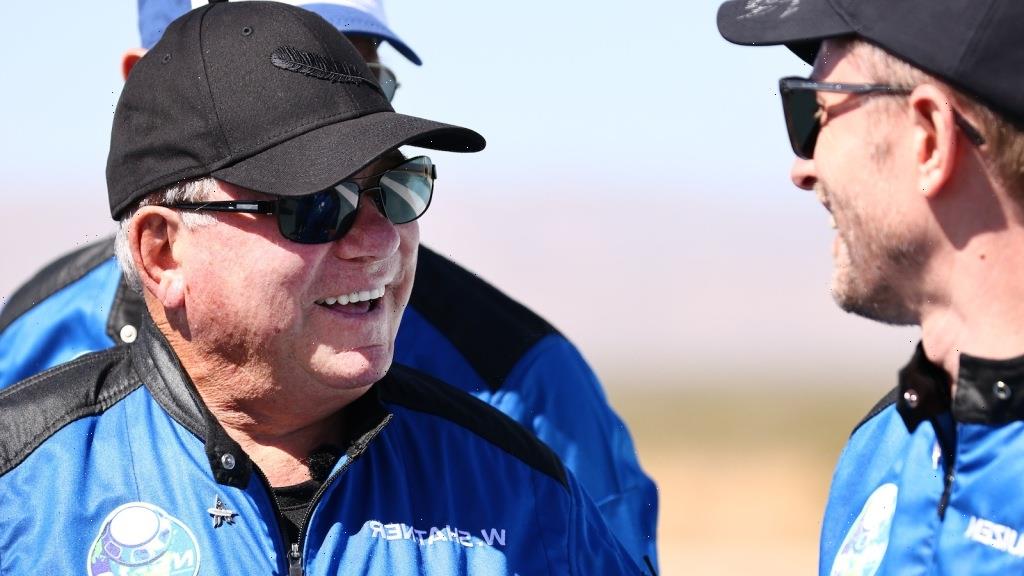William Shatner kicks things off with a compliment.
We’re talking via Zoom — he’s beaming in from the sprawling kitchen of his Los Angeles home, which overlooks the San Fernando Valley. I’m dialing in from the living room of my walkup apartment in Brooklyn, a much more modest setting. But Shatner is impressed by the over-stocked bookcase behind me, as well as the paintings, a seascape and an impressionist pastoral scene that I inherited from my grandmother, that line the wall around it.
“You have terrific taste,” Shatner exclaims with the kind of brio that Captain James T. Kirk, his most famous alter-ego, approached his mission “to explore strange new worlds, seek out new life and new civilizations, [and] boldly go where no man has gone before!”
But Shatner isn’t just here to talk about “Star Trek,” though his time commanding the Starship Enterprise invariably comes up. Instead, he’s discussing “You Can Call Me Bill,” a new documentary that covers Shatner’s career highlights — from the “Star Trek” films and series to “T.J. Hooker” and “Boston Legal” — as well as his acting idols (Brando and Olivier) and love of nature. The film, which is directed by Alexandre O. Philippe and which premieres at SXSW, is also a meditation on mortality, something that the 91-year-old Shatner has been thinking a great deal about these days.
Why did you decide to make the documentary?
I’ve turned down a lot of offers to do documentaries before. But I don’t have long to live. Whether I keel over as I’m speaking to you or 10 years from now, my time is limited, so that’s very much a factor. I’ve got grandchildren. This documentary is a way of reaching out after I die.
Did you learn something about yourself that you didn’t know before you made this film?
Time and time again, I’ve come across some interesting thought or idea. That can be because of a thoughtful interviewer sparking something in me. In the movie, I didn’t just want to go on about I did this or that when I was 7 or this is my favorite color. I’m trying to discover something I’ve never said before or to find a way to say something I’ve said before in a different way, so I can explore that truth further. I read all the time — newspapers and books. I’m feeding my mind. The sad thing is that the older a person gets the wiser they become and then they die with all that knowledge. And it’s gone. It’s not like I’m going to take my ideas or my clothing with me. Today, there’s a person going through some of my clothes in order to donate or sell them, because what am I going to do with all these suits that I’ve got? What am I going to do with all these thoughts? What am I going to do with 90 years of observations? The moths of extinction will eat my brain as they will my clothing and it will all disappear.
That’s sad. What about your legacy?
When Leonard Nimoy died a few years ago, his funeral was on a Sunday. His death was very sudden, and I had obligated myself to go to Mar-a-Lago for a Red Cross fundraiser. I was one of the celebrities raising money. That event was on Saturday night. I chose to keep my promise and go to Mar-a-Lago instead of the funeral, and I said to the audience, “People ask about a legacy. There’s no legacy. Statues are torn down. Graveyards are ransacked. Headstones are knocked over. No one remembers anyone. Who remembers Danny Kaye or Cary Grant? They were great stars. But they’re gone and no one cares.” But what does live on are good deeds. If you do a good deed, it reverberates to the end of time. It’s the butterfly effect thing. That’s why I have done this film.
Your decision not to attend Leonard Nimoy’s funeral was controversial. How did the backlash feel? Do you regret your decision?
Who cares? I know what I did was right. So it doesn’t matter. We’re criticized when we lift a finger. I don’t read that stuff. I try to not to indulge in the evil that’s out there.
Everyone thinks about dying, but actors actually get to act out what it’s like to die on stage or on film. Does that change your perspective on death?
There was a time when actors, and I include myself in this, would portray death by falling to the ground and your eyes would flicker and you’d slump around and then you’re dead. That’s not how you die. This is how you die [Shatner’s eyes go wide abruptly and his breath stops]. See? I’m dead. Ever put a dog down? When I have to put a dog down and I’m at the vet, I cup my dog’s head and I say, “I’m with you baby, I’m with you.” And the injection goes in and the dog looks at me with love, and that’s it. You don’t know they’re dead. That’s how you die. It’s abrupt. My wife’s brother walked out of the living room and into the bedroom. There was a thud. His wife walked in, and he was dead. Death comes anew to all of us.
In “Star Trek: Generations” you got to have some say in how Kirk died. In that scene, he approaches his last moments with wonder. Why was that something you pushed for?
I’m of the opinion that you die the way you live. I thought Kirk would die with a “Wow, look at that coming at me. There’s a guy with a scythe. Holy shit!” He’d seen all these weird aliens before. Here comes death and he meets it with awe and a sense of discovery.
You’ve been touring the country doing sold-out screenings of “Star Trek II: The Wraith of Khan,” a movie that came out in 1982. Danny Kaye and Cary Grant aside, some of your movies are going to outlast you. Is that comforting?
They’ll be good for another 10 years, maybe five. I’ve made all these films that are popular, so I’m sure they’ll pop up every so often. But I don’t need validation from a film I made in 1982. I get pleasure in talking to you right now.
In “You Can Call Me Bill,” you talk about thinking frequently about how you’re 91-years-old and you won’t get to see the people your grandchildren grow up to be. What is that like to realize that?
I have a grandson named Sebastian, who is 3 months old and already he’s got a mischievous smile. He’s already a little bit of a comic. His mother and father are lovely people. You look into his eyes, and you can see the aspects of what he will be like. If hunger and disease and bad fortune don’t disturb him too much, he should become this wonderful, amusing human being. So with the time I have left, I like to look at all my grandchildren and try to extract what I can out of my impressions.
Do you like going to these “Star Trek” screenings and conventions and being in front of all those fans?
I don’t enjoy being tugged at, but I enjoy answering questions and being in front of thousands of people.
Do you have a favorite role?
No. I just try to have a good time on the set. I just did a commercial for a watch that I designed. It has a face with a telescope, a sun, the milky way. And the watch company did this whole science fiction background for me to talk about it. Well, there’s a part of the commercial where they use CGI to have a meteorite land next to me. I ad lib, “That’s a lot of meteorite.” That was a pretty funny improv. I did that on Monday, and that’s become one of my favorite moments. I don’t know what it’s like for others. I went to watch Dwight Yoakam record an album last night, because I have no idea how a great artist makes their art. It’s like, how does everybody else fuck? You have no idea. I don’t know if he has a favorite album, and I don’t know if I don’t have a favorite role.
In 2021, you went into space on Jeff Bezos’ Blue Origin space shuttle and you said it made you weep because it gave you a better sense of what is happening to the planet. What did you mean?
When I came out of the space ship I was crying, just sobbing, and I thought why am I crying? What’s going on? I’m in grief. What am I grieving about? Oh shit, I’m grieving about the world, because I now know so much about what’s happening. I saw the Earth and its beauty and its destruction. It’s going extinct. Billions of years of evolution may vanish. It’s sacred, it’s holy, it’s life and it’s gone. It’s beyond tragic. We stupid fucking animals are destroying this gorgeous thing called the Earth. Doesn’t that make you angry? Don’t you want to do something about it?
Read More About:
Source: Read Full Article


